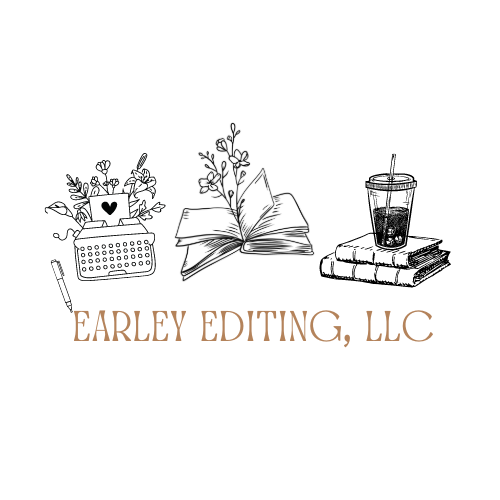How Authors can Find a Book Editor
Finding a book editor can be a crucial step in the publishing process. It can also be intimidating because how do you find a reputable editor? How do you know they fit in your publishing budget? How do you know the editor is reputable? Well, let’s go over some steps authors can take to find a suitable book editor:
Identify Editing Needs: Determine the type of editing you require for your manuscript. Different editors specialize in various areas, such as developmental editing, line editing, copyediting, or proofreading. Understanding your specific needs will help you narrow down your search for the right editor. Some editors, like Earley Editing, LLC, offer package deals due to having a team of editors specializing in different areas.
Research: Most reputable editors can be found with a simple Google search or on social media platforms such as Instagram and TikTok. While you should proceed with caution with any editor until you’ve done your research, any writer should be extra cautious when it comes to reaching out to an editor via Facebook or Fiverr.
Seek Recommendations: Ask for recommendations from fellow authors, writing groups, or literary communities. Personal referrals can provide valuable insights and help you find editors who have a proven track record and positive reputation.
Utilize Professional Organizations and Directories: Explore professional organizations and directories that connect authors with editors, such as the Editorial Freelancers Association (EFA), or ACES: the Society for Editing. These platforms often have directories or referral services that can help you find qualified editors.
Research Editor's Background and Experience: Once you've identified potential editors, research their background, credentials, and portfolio. Check if they have experience in your genre or subject matter.
Budget Considerations: Determine your budget for professional editing services. Editors' rates can vary based on their experience, expertise, and the level of editing required. It's crucial to find an editor whose services align with your budget while ensuring quality work. Most editors charge per word or by hour.
Publishing Timeline Considerations: If you have a publication date in mind, you need to reach out to an editor to check their availability. Editors typically book out 3 or 6+ months in advance, so keep this in mind when thinking of a publishing timeline. Rather than having a set date in your mind, you might have to consider moving your date.
Request a Sample Edit: Many editors offer sample edits or a free consultation. Take advantage of these opportunities to gauge their editing style, communication skills, and how well they understand your project. It's essential to find an editor whose approach aligns with your writing goals. You want an editor that will work with you.
Review Contracts and Agreements: Before finalizing an agreement, carefully review the editor's contract or agreement terms. Pay attention to the scope of work, timelines, payment terms, and any rights or confidentiality agreements. A contract should clearly protect you (the writer), the work, and hold the editor accountable.
Remember, working with an editor is a collaborative process. Take your time to find the right one for your story by doing thorough research and prioritize finding an editor who understands your vision, enhances your writing, and helps you polish your manuscript to its best possible form.
